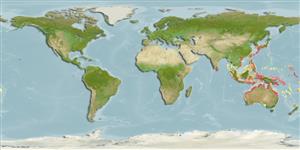Environment: milieu / climate zone / depth range / distribution range
Ecologia
marino; acqua dolce; salmastro benthopelagico; amfidromo; distribuzione batimetrica 0 - 5 m (Ref. 86942). Tropical; 20°C - 28°C (Ref. 13614)
Indo-West Pacific: Sulawesi, Indonesia to western and eastern Australia and New Caledonia.
Size / Peso / Age
Maturity: Lm ? range ? - ? cm
Max length : 40.0 cm SL maschio/sesso non determinato; (Ref. 48637)
Spine dorsali (totale) : 7 - 12; Raggi dorsali molli (totale) : 16; Spine anali: 4; Raggi anali molli: 15 - 16. Greenish or silvery; individuals greater than 4 cm SL with 7 to 12 narrow dark vertical bars on dorsal half of flanks and with spots, usually smaller than eye, more or less arranged in vertical rows in ventral half; lips black; posterior edge of caudal fin and soft portions of anal and dorsal fins with a narrow black margin which disappear in individuals larger than 6 cm SL (Ref. 43044).
Found in coastal estuaries, river entrances and rock pools (Ref. 9002, 44894). Inhabits mangrove creeks and the lower reaches of freshwater streams (Ref. 44894). Anterolateral glandular groove with venom gland (Ref. 57406). Sometimes sold fresh in markets (Ref. 43044). Juveniles collected for the aquarium trade (Ref. 43044).
Life cycle and mating behavior
Maturities | Riproduzione | Spawnings | Egg(s) | Fecundities | Larve
Kottelat, M., 2001. Scatophagidae. Scats. p. 3623-3626. In K.E. Carpenter and V. Niem (eds.) FAO species identification guide for fishery purposes. The living marine resources of the Western Central Pacific. Vol. 6. Bony fishes part 4 (Labridae to Latimeriidae), estuarine crocodiles. FAO, Rome. (Ref. 43044)
IUCN Red List Status (Ref. 130435)
Human uses
Pesca: scarso interesse commerciale; Acquario: Commerciale
Strumenti
Special reports
Download XML
Fonti Internet
Estimates based on models
Preferred temperature (Ref.
123201): 21.4 - 29.3, mean 28.4 °C (based on 2076 cells).
Phylogenetic diversity index (Ref.
82804): PD
50 = 0.8125 [Uniqueness, from 0.5 = low to 2.0 = high].
Bayesian length-weight: a=0.02570 (0.01001 - 0.06601), b=2.96 (2.75 - 3.17), in cm total length, based on LWR estimates for this (Sub)family-body shape (Ref.
93245).
Trophic level (Ref.
69278): 2.9 ±0.3 se; based on size and trophs of closest relatives
Resilienza (Ref.
120179): Alto, tempo minimo di raddoppiamento della popolazione meno di 15 mesi (Preliminary K or Fecundity.).
Fishing Vulnerability (Ref.
59153): Moderate vulnerability (39 of 100).
